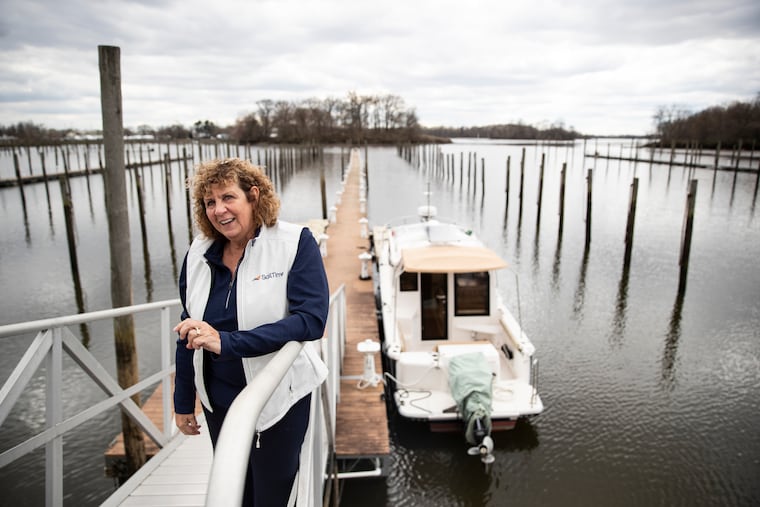Is Pennsylvania landlocked? The answer isn’t so simple.
People who participated in a poll were nearly evenly split on the question.

In 2015, social media was preoccupied with whether a certain dress was blue or gold.
Last year, it was all about the number of wheels versus doors in the world.
Now, folks are asking the prosaic-yet-somehow-compelling question of whether Pennsylvania is a landlocked state.
More than 10,000 people voted on Twitter in an informal poll conducted two weeks ago by the Ettingermentum Substack newsletter. The results — nearly a 50-50, yes/no split — garnered more than 250,000 views, according to the newsletter, which focuses on politics and history.
“It’s an interesting and quirky question,” said Frank Galgano, executive director of the Pennsylvania Geographical Society, and a geography professor at Villanova University.
But the answer isn’t as clear-cut as you might think.
First, a definition: A landlocked state is often described as being surrounded almost entirely by land, with no access to ocean coastlines or seaports.
The commonwealth obviously features two wet borders, neither with ocean views, but both with eventual access to the sea: Lake Erie in the north, which ultimately connects to the Atlantic Ocean through the Saint Lawrence Seaway; and the Delaware in the east which, as William Penn could tell you, leads to the Delaware Bay and the Atlantic.
So, is the Keystone State landlocked? People on Twitter weren’t shy about weighing in:
“If you have to take a boat to get to the ocean you’re landlocked,” says @buckbuckwhatup. “It’s that simple.”
“If you have a major seaport [like Philadelphia] you aren’t landlocked!” says @vituperativeerb.
“The Marines and the NAVY were founded in Philadelphia,” says @Andypry. “Seems pretty aquatic to me.”
Castigating the notion that a waterway that eventually leads to the ocean confers unlocked status, @FrankStalworth asserts, “Missouri can get to the ocean using the Mississippi River, ... [but] I’d say Missouri is pretty solidly landlocked.”
Even experts seem divided.
A website called GeographyRealm lists Pennsylvania among the 27 landlocked states, hemmed in as much as Colorado or Wyoming.
Meanwhile, World Population Review, a website that presents demographic analysis, tells us Pennsylvania isn’t enclosed because the eight Great Lakes states have distant access to the ocean.
Muddying things further, World Atlas introduces degrees of landlocked-ness. For example, it says, Nebraska is the country’s most penned-in state because it’s “triply landlocked” — one must travel through at least three states to reach an ocean.
By that standard, Pennsylvania is “singly landlocked,” according to the Review, because a person could reach the ocean by cutting across one of four states — New Jersey, Delaware, Maryland, or New York.
For his part, Galgano said the Delaware is the key to determining that the state isn’t landlocked.
The river is an estuary, part of a coastal zone, he said, because it has tides and, in some parts, brackish water, a combination of salty and fresh.
“If you’re in a coastal zone, you have a direct connection to the ocean, which makes us not landlocked,” Galgano said.
The tidally influenced Delaware estuary extends from Cape May and Cape Henlopen, Lewes, Del., north to Trenton, said ecologist Danielle Kreeger, senior science director for the Partnership for the Delaware Estuary.
“So,” she added, “Philadelphia and Camden sit on a U.S. coastline, and the Port of Philadelphia is deemed a strategically important national seaport in a state that’s definitely not landlocked.”
Beyond that, Kreeger noted, Pennsylvania receives federal money specifically because it isn’t landlocked, from the National Oceanic and Atmospheric Administration’s National Coastal Zone Management Program.
Coastal geologist Kimberly McKenna, interim executive director of the Coastal Research Center at Stockton University in Galloway Township, Atlantic County, said that not just the river un-locks Pennsylvania: “The state’s Lake Erie coast is considered a shoreline by the federal government, making Pennsylvania not landlocked.”
By the way, if you believe a state that’s had a shark attack couldn’t be landlocked, then Pennsylvania qualifies.
In 1961, a worker named Charles Peterson at the now-defunct Philadelphia Aquarium at Fairmount Water Works suffered a lacerated thumb from a shark while he cleaned a tank, according to the Shark Research Institute.
It wasn’t Jaws, but it got people’s attention.
Ultimately, said Cherie Kemper-Starner, owner of SailTime Philadelphia, a sailing club and school in Penns Landing, anybody who’s sailed a boat from the Delaware to the ocean could tell you that the commonwealth is not landlocked.
“No way,” she said. “My gosh, this part of the world was founded by people on sailing vessels.”
Amused by the landlocked question, Kurt Cheng, shellfish science manager at the Partnership for the Delaware Estuary, said that if people really wanted to be spun up by a brain teaser, “ask them if they think New Jersey is a peninsula.”
If people say no, Cheng suggested, “try driving there from Pennsylvania without a bridge.”
That concept might be too much for even social media to handle.